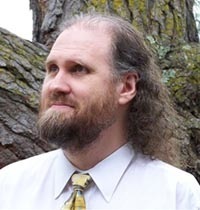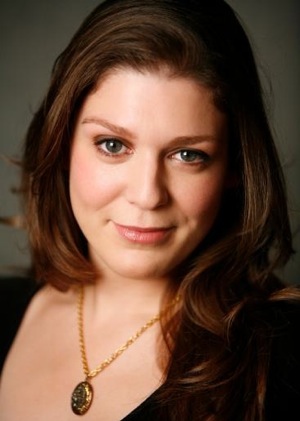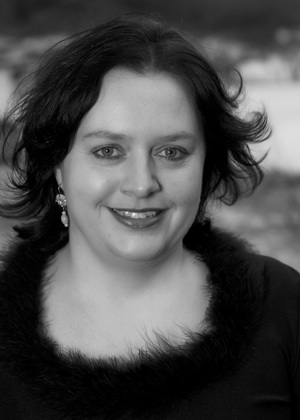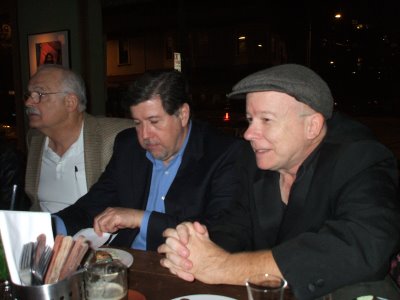Fresh and in the Mission.
Who says opera has to be stuffy? Goat Hall Productions, in its thirteenth year of “Fresh Voices” programs, tweaked the noses of the earnest with three delightful short operas last weekend at San Francisco’s Community Music Center. During the program, titled Mischief and Mayhem, a music educator, medieval Italian Plague survivors, and “Quark Sisters” from a parallel universe took turns regaling the audience.
 Allan Crossman introduced his “Mozart! Where are you?” from the stage, describing it as the lives and loves of students struggling to find their voice. In this excerpt, a young composition student strives for originality while first hewing to the musical forms of Mozart, and then facing a contemporary stylist. Her classical music professor was well played by bass Richard Mix, who declaimed his rules for success: “There will be no perfect fifths, only contrary motions, and dissonance only in passing.” A true bass, Mix went on to sing in tones that were ringing and rounded with an edge of gravel, “You must make music from simplicity, and beauty from symmetry…”
Allan Crossman introduced his “Mozart! Where are you?” from the stage, describing it as the lives and loves of students struggling to find their voice. In this excerpt, a young composition student strives for originality while first hewing to the musical forms of Mozart, and then facing a contemporary stylist. Her classical music professor was well played by bass Richard Mix, who declaimed his rules for success: “There will be no perfect fifths, only contrary motions, and dissonance only in passing.” A true bass, Mix went on to sing in tones that were ringing and rounded with an edge of gravel, “You must make music from simplicity, and beauty from symmetry…”
 His modern counterpart, sung by mezzo Molly Mahoney, reproved, “Freedom from symmetry, freedom from the logic of form…” and imbued her instructions with plunging intervals. In between, the student, Supriya Sanjay, sang of originality in a voice of light clarity, well suited to the repeated idioms of American musicals.
His modern counterpart, sung by mezzo Molly Mahoney, reproved, “Freedom from symmetry, freedom from the logic of form…” and imbued her instructions with plunging intervals. In between, the student, Supriya Sanjay, sang of originality in a voice of light clarity, well suited to the repeated idioms of American musicals.
Although the premise was fun and the singing splendid, Crossman did not go far enough to reprise Mozart’s brilliance of form and harmony, nor modernity’s promised freedom, relying on a simple piano line.
He redeemed himself with a selection of star-crossed loves, beautifully sung by Mahoney, and with a full and thoughtful piano accompaniment. In The Log of the Skipper’s Wife, the text is excerpted from the diary of Dorothea Balano; a long spoken description of navigation (perhaps as a metaphor for finding the balance in relationship) is followed by a lovely and complex piano part, with multiple voices “arguing.”
Composer Mark Alburger, fresh from the success of his opera, Sex and the Bible, next offered a work-in-progress based on the Decameron, a fourteenth century group of 100 ribald tales by Boccaccio reputedly told by a small group escaping the plague in Florence. His ten stories from the first day are blessed with witty rhythms and punchy harmonies.
Alburger, the originator of the ongoing monthly Opus Projects in downtown Berkeley, and Music Director of the San Francisco Composers Chamber Orchestra, is also the composer half of Goat Hall Productions (a.k.a. San Francisco Cabaret Opera) along with Harriet March Page, who directed two of the three operettas on this program.

An intriguing blend of pop, minimalism and sternly atonal was set against gorgeous harmonies and propelled forward with beats that went from blues to Latin to jazz cross rhythms. Alburger narrated and sang a comic tenor line, supplementing the four women’s voices: mezzo-sopranos Kate Bautch and Jill Wagoner and sopranos Sarita Cannon and Cass Panuska, all first rate singers. The opening tale featured dense four-part harmonies interrupted by sudden unisons and staccato tongue twisters, a real wow moment for the evening.
Keisuke Nakagoshi accompanied on piano, supplying a wealth of colors.
John Bilotta’s tongue-in-cheek Quantum Mechanic rounded out the night with strangeness and charm, again with the excellent accompaniment of Nakagoshi for the demanding score. This delightful 15-minute opera first appeared as the 2007 prizewinner at Utah’s Vocal Works.
Fine staging and supple acting by the three Quark Sisters, sung by Sarita Cannon, Michelle Jasso and Molly Mahoney, supplied the foil for another star moment, Norwegian mezzo-soprano Bettina Smith as Mrs. Schroedinger. Smith’s delivery was buttery, even in the highest notes, and her classical operatic approach (as opposed to the eye-batting pop that the Quarks deftly delivered) conjured the physicists of Schroedinger’s era. Justin Marsh played the bumbling quantum mechanic with a suave tenor and some surprising “chemistry” moments with the Missus.
Alburger returned to introduce and conclude the opera as a futurist Aesop, trading the white toga of his Decameron character for a spangly Mylar update, and leading them in one last chorus line romp.
The only thing that Bilotta and his librettist, John McGrew, left out of their deadpan delivery of string theory jokes and fuzzy logic was, “Assume a spherical chicken of radius r… in a vacuum!” Well, maybe you had to be there.

—Adam Broner
Picture, top of bass Richard Mix; then mezzo-soprano Molly Mahoney, photo by Betsy Kershner; and lower, Bettina Smith, photo by Yaniv Cohen. Bottom is Mark Alburger, John Bilotta and John McGrew (from right).
